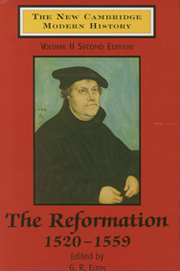Book contents
- Frontmatter
- Introduction to the second edition
- Chapter I The age of the Reformation
- Chapter II Economic change
- Chapter III The reformation movements in Germany
- Chapter IV The Reformation in Zurich, Strassburg and Geneva
- Chapter V The Anabaptists and the sects
- Chapter VI The Reformation in Scandinavia and the Baltic
- Chapter VII Politics and the institutionalisation of reform in Germany
- Chapter VIII Poland, Bohemia and Hungary
- Chapter IX The Reformation in France, 1515–1559
- Chapter X The Reformation in England
- Chapter XI Italy and the papacy
- Chapter XII The new orders
- Chapter XIII The empire of Charles V in Europe
- Chapter XIV The Habsburg–Valois wars
- Chapter XV Intellectual tendencies
- Chapter XVI Schools and universities
- Chapter XVII Constitutional development and political thought in western Europe
- Chapter XVIII Constitutional development and political thought in the Holy Roman Empire
- Chapter XIX Constitutional development and political thought in eastern Europe
- Chapter XX Armies, navies and the art of war
- Chapter XXI The Ottoman empire 1520–1566
- Chapter XXII Russia, 1462–1584
- Chapter XXIII The New World, 1521–1580
- Chapter XXIV Europe and the East
- Index
- References
Chapter XXIV - Europe and the East
Published online by Cambridge University Press: 28 March 2008
- Frontmatter
- Introduction to the second edition
- Chapter I The age of the Reformation
- Chapter II Economic change
- Chapter III The reformation movements in Germany
- Chapter IV The Reformation in Zurich, Strassburg and Geneva
- Chapter V The Anabaptists and the sects
- Chapter VI The Reformation in Scandinavia and the Baltic
- Chapter VII Politics and the institutionalisation of reform in Germany
- Chapter VIII Poland, Bohemia and Hungary
- Chapter IX The Reformation in France, 1515–1559
- Chapter X The Reformation in England
- Chapter XI Italy and the papacy
- Chapter XII The new orders
- Chapter XIII The empire of Charles V in Europe
- Chapter XIV The Habsburg–Valois wars
- Chapter XV Intellectual tendencies
- Chapter XVI Schools and universities
- Chapter XVII Constitutional development and political thought in western Europe
- Chapter XVIII Constitutional development and political thought in the Holy Roman Empire
- Chapter XIX Constitutional development and political thought in eastern Europe
- Chapter XX Armies, navies and the art of war
- Chapter XXI The Ottoman empire 1520–1566
- Chapter XXII Russia, 1462–1584
- Chapter XXIII The New World, 1521–1580
- Chapter XXIV Europe and the East
- Index
- References
Summary
First among Europeans to reach the East by sea were the Portuguese. Opening the new route round the Cape in 1498, they quickly appreciated the opportunities of the vast maritime economy, reaching from East Africa to the Pacific, they had now entered. By force, blandishments and the adept exploitation of local rivalries they had acquired, by the time Afonso de Albuquerque relinquished the office of governor (1515), a string of posts reaching from the Persian Gulf to Indonesia. The office of viceroy was instituted in what came to be termed the ‘State of India’ and some of the familiar machinery of Portuguese royal government was introduced. But with distances so great and the resources of the Lusitanian monarchy so few the authority of the Crown was never more than feeble. Meanwhile private ambitions flourished and private wealth grew. In 1580 the king had the burdens of government and private merchants most of the profit from trade, a sure sign that overseas enterprise had failed to fulfil the hopes which members of the royal family of Portugal had put in it since the early part of the fifteenth century.
Portuguese interest in the East stemmed from hopes of a godly blow against infidels and a quest for land and riches in the eastern Atlantic and West Africa in which a vital, but by no means unique, role had been played by Prince Henry ‘the Navigator’. As governor of the military Order of Christ, the prince sent out his first explorers of the African coast in 1421. About thirty-five years later the pope granted the Order of Christ spiritual jurisdiction and freedom to trade ’as far as the Indians’. From that time, if not before, the Portuguese were probably concerned with the idea of a sea route to India. They did not find it swiftly: not till 1488 did a Portuguese vessel pass east of the Cape of Good Hope. Shortly afterwards King John II seems to have received news of ports of western India and south-eastern Africa. It now became almost certain that men could reach Asia by sea. But no Portuguese tried to do so until 1497 when Vasco da Gama set out on his first major voyage, in command of a royal fleet.
- Type
- Chapter
- Information
- The New Cambridge Modern History , pp. 656 - 682Publisher: Cambridge University PressPrint publication year: 1990



